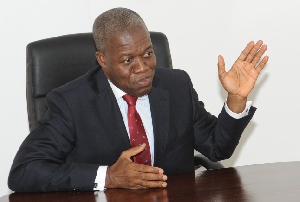The current monetary policy reforms by the Bank of Ghana (BoG) are to restore policy credibility, stability and certainty in the Ghanaian economy, Vice President Kwesi Amissah-Arthur has explained.
He said the reforms also seek to enforce legal requirements for doing business and reduce the “dollarization” of the Ghanaian economy and to assure both domestic and foreign investors that “we will work to create a competitive environment that assure them of adequate returns on their investment.
There has been mixed reactions to the BoG’s action, with new directives last week to banks and foreign exchange bureau operators to stabilize Ghana’s foreign exchange rate from depreciation has occurred in the last few months.
Actors in the export sector have applauded the measures, but others, importers are seeing them as a frustration, but the Vice President told the opening session of the fourth annual America Chambers of Commerce (Amcham) in African Summit, underway in Accra that Ghana stood to benefit from exchange reforms with result social sector interventions to protect the poor and achieve the Millennium Development Goals.
“The exchange rate action has to be put in the proper context. Resulting from exchange reforms, Ghana has made significant economic successes; growth rates averaged seven per cent between 2001 and 2012 allowing us to introduce social sector interventions to protect the poor and achieve the MDGs.
“It is therefore not our intention to abandon the policy that has contributed importantly ton improving livelihoods,” Vice President Amissah-Arthur said.
The Vice President said the reform of the exchange system and the maintenance of an appropriate incentive structure for the country was a central plank of economic reforms in Ghana in the early 1980S and has remained Government policy.
Vice President Amissah-Arthur observed that Ghana experienced significant challenges in 2013, as result of worsening global market conditions with negative consequences on emerging and frontier economies.
These, he said, have aggravated short term risks and vulnerabilities and contributing to uncertainty and instability.
He said Ghana’s two major exports-cocoa and gold have suffered a decline since 2011, Cocoa prices have cumulatively declined by about 20 per cent since 2011, and gold a price decline of about 25 per cent since 2011.
“In 2013, Ghana lost .3 billion potential export revenue due to price declines on these two exports. These have put pressure on our foreign reserves and contributed to the high rates of currency depreciation,” Vice President Amissah-Arthur said.
He also noted that the tapering of the US Federal Reserve’s Board stimulus program has contributed to the reversal of capital flows leading to volatility in currency and equity markets in emerging economies, with resultant increase in global interest “ and threatening us with debt servicing”, that require the authorities to restore stability.
Vice President Amissah-Arthur said the expiration of the African Growth and Opportunity Act, a major instrument in promoting African export enacted in 2000, and the currently challenging and uncertain environment require the creation of new market opportunities for African exporters.
“This is the time to change the US-Africa relationship from one of donor and recipient to that of business partners, especially in the key countries and critical sectors,” the vice President advocated.
Mr Gene Cretz, the United States of America Ambassador in Ghana, said the value placed on products a ad services from Washington are based on innovative spirit, reliance on local talent, strong business values, sound environmental practices and commitment to community.
Being hosted by the Africa Bureau of the US Chamber of Commerce, the two-day summit, on the theme Building the American Brand” is being attended by Amcham members from sub-Sahara Africa, US Government officials, Government of Ghana dignitaries and the US Chamber of Commerce executives.
Conference participants will discuss various strategies designed to drive the growth of US private sector investment and bilateral trade with Africa.
Participants will also discuss US Government policies and initiatives aimed at accelerating the development of African economies, a release from AmCham Ghana said.
Business News of Wednesday, 12 February 2014
Source: GNA













